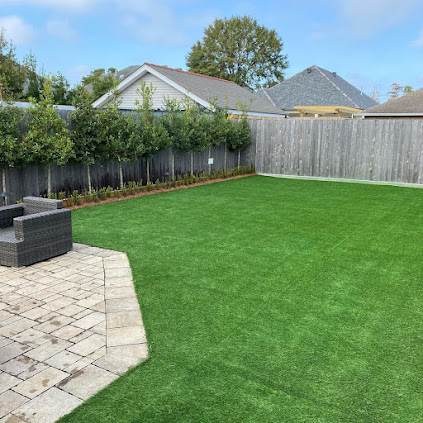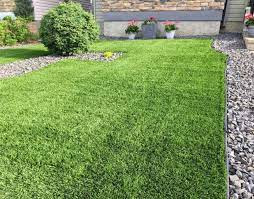Step by Step Guide to Installing Artificial Grass
Installing artificial grass can be a DIY project if you have some basic DIY skills and the right tools. Here's a step-by-step guide to help you install artificial grass in your outdoor space:
Tools and Materials You'll Need:
Step 1: Prepare the
Area
a. Clear the area of any existing grass, weeds, rocks, or debris.
b. Level the ground using a shovel and rake. Ensure it's smooth and has a slight slope away from any structures for drainage.
c. Compact the soil with a plate compactor or hand tamper to create a firm base.
Step 2: Install a
Weed Barrier
a. Lay down weed barrier fabric over the prepared ground. Overlap the seams by a few inches and secure the fabric to the ground with landscape staples or pins.
Step 3: Create a Base
a. Add a layer of crushed stone or decomposed granite to create a stable base. Spread it evenly to a depth of about 2-3 inches.
b. Compact the base material thoroughly using a plate compactor or hand tamper.
Step 4: Install
Edging
a. Install edging material (bender board or landscape timbers) around the perimeter of the area. Secure them with nails or stakes to hold the artificial grass in place.
Step 5: Lay the
Artificial Grass
a. Roll out the artificial grass over the prepared area, allowing it to acclimate to the temperature and flatten out any wrinkles.
b. Trim the edges of the grass with a carpet cutter or utility knife as needed to fit the space.
c. If you have multiple pieces of grass to join, use seaming tape and adhesive to create a seamless look.
Step 6: Secure the
Grass
a. Secure the artificial grass around the edges using landscape staples or nails, making sure it's taut and doesn't shift.
Step 7: Add a Layer
of Sand
a. Spread a thin layer of sand evenly over the artificial grass to help the blades stand up and provide stability.
Step 8: Brush and
Compact
a. Use a power brush or broom to brush the grass fibers in an upright position and evenly distribute the sand.
b. Run a lawn roller over the entire surface to further compact the artificial grass.
Step 9: Apply Infill
Material
a. If recommended for your specific artificial grass product, spread infill material (usually a mixture of silica sand and rubber crumb) over the surface.
b. Brush and distribute the infill evenly into the grass fibers.
Step 10: Final
Inspection
a. Inspect the entire installation to ensure everything is secure, level, and looks as desired.
With these steps completed, your artificial grass should be installed and ready for use. Keep in mind that the specific instructions and materials may vary depending on the type and brand of artificial grass you choose, so be sure to follow the manufacturer's guidelines for the best results.




Comments
Post a Comment